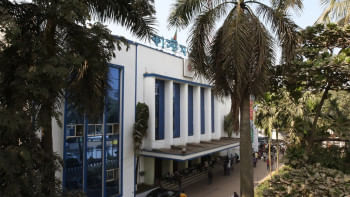Malaysia slaps levy on migrant workers
Around 3 lakh registered Bangladeshi migrant workers in Malaysia would have to pay the levy previously paid by their employers as the country yesterday imposed a new levy on foreign workers.
“The Malaysian employers usually used to pay the levy on behalf of the workers. But the government has imposed it on the workers in the new system,” Sayedul Islam, labour counsellor at Bangladesh High Commission in Kuala Lumpur, told The Daily Star over phone.
He however said they were negotiating with the Malaysian government to exclude the Bangladeshi workers.
“We are now negotiating to sign a new MoU [memorandum of understanding] with the Malaysian government for recruiting fresh workers from Bangladesh. We have requested them to exclude the Bangladeshis from the new levy,” Sayedul added.
Malaysian Deputy Prime Minister Datuk Seri Dr Ahmad Zahid Hamidi on Sunday said about 2.1 million registered foreign workers would come under the decision as they enjoyed many benefits like food subsidy and other services meant for the Malaysians.
The revised levy would bring additional revenue of RM 2.5 billion to the Malaysian government's coffer, reported Malaysian English daily The Star quoting the minister yesterday.
The foreign workers in construction and manufacturing sectors will pay Malaysian ringgit (RM) 2,500 equivalent to Tk 47,205 up from RM 1,250 or equivalent Tk 23,598 each, according to the recent decision of the Malaysian government.
Workers of the service sector will pay the same amount although they used to pay RM 1,850 or equivalent to Tk 34,926 each.
The new levy in the plantation and agriculture sectors has been set at RM 1,500 or equivalent to Tk 28,322, while it was only RM 410 or equivalent Tk 8,496 in the past. However, the levy for foreign domestic workers remains the same RM 410.
Officials at the Bangladesh High Commission observe that the new levy will put an additional pressure on the workers.
“Each foreign worker who is staying in Malaysia and who will enter here has to pay the levy once a year. So, the registered Bangladeshis will also come under it,” Sayedul mentioned.
The labour counsellor expressed the hope that the Bangladeshi workers, who would be hired after signing of the MoU, can enjoy levy free facilities.
Asked if migration costs would go up due to the new levy imposition, he said there would be no impact on the workers' migration expenditures.
However, Bangladesh Association of International Recruiting Agencies (Baira) President Mohammed Abul Basher told The Daily Star that the new levy would definitely increase migration costs if the workers were to pay it.
“If employers pay the levy, migration costs will not increase,” he added.
Currently, workers from Bangladesh are going to Malaysia only for plantation jobs since April 2013 under a government to government (G2G) agreement, which could reduce migration costs significantly. But the system has failed apparently due to impractical measures taken by both the governments.
Malaysia has now agreed to hire the Bangladeshis for all sectors -- construction, industries, services and plantations. Dhaka and Kuala Lumpur are working to finalise an agreement to that end.

 For all latest news, follow The Daily Star's Google News channel.
For all latest news, follow The Daily Star's Google News channel. 








Comments